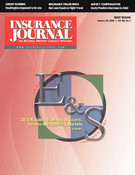The Market Is Huge, but Some Independents Say It’s Difficult
In business, change brings opportunity. And when it comes to the rapid wave of states that have recently legalized gay marriage, some see a marketing opportunity in selling insurance products for legally wedded gay couples.
And why not? The “gay market” in the United States is huge, according to Texas-based Merge Media, which estimated the buying power of the lesbian, gay, bisexual and transgender (LGBT) community to be roughly $800 billion in 2008. And what’s more, the LGBT tends to have a strong allegiance to a particular brand — something that insurance companies, which tend to focus on branding initiatives likes sports events (NCAA, NASCAR, the PGE) — love.
Merge Media, with a client list that includes BMW, Coors and Hotels.com, said 89 percent of LGBT adults are highly likely to seek out a brand that advertises in gay media, and three out of four have a strong preference for a brand that markets directly to them. One in four LGBT adults reported switching brands recently to a competing company that supported LGBT.
Plus, LGBT adults are far more tech savvy (twice as likely to own a WiFi laptop and three times as likely to conduct financial transactions online) and are twice as likely to have a portfolio worth more than $1 million, and twice as likely to have an annual income greater than $250,000.
It’s a bandwagon that at least some of the savvy insurance agents realize they should jump on. And it’s one that’s growing.
At last tally in June, six states – Connecticut, Iowa, Maine, Massachusetts, New Hampshire and Vermont — had approved gay marriage laws. In California, a lawsuit currently in U.S. district court seeks to overturn a voter-approved gay marriage ban called Proposition 8. In 2008, California voters passed the measure by a margin of 52 to 48 percent. Same-sex couples are hoping to overturn the ban.
The final decision in the lawsuit could influence other states’ same-sex policies. But at least in the short-term, regardless of the outcome of the trial, in California and eight other states — Colorado, the District of Columbia, Hawaii, Maryland New Jersey, Nevada, Oregon and Washington — civil unions for LGBT adults are formally recognized.
In many of the regions that have allowed civil unions for the past few years, however, at least a few independent insurance agents report having at least some difficulty pursuing the LGBT market
Take Kevin B. Foley, owner of PFT&K Insurance Brokers in Central New Jersey, a state in which the legislature passed a law recognizing gay civil unions in 2006. In response, many insurance carriers in the state began emphasizing coverage for LGBT adults in civil unions.
Insurance, when mentioned by supporters of gay marriage, usually means health insurance or life insurance, under which unrecognized partners often miss benefits and access to coverage. But there are many aspects of property/casualty lines where the recognition of a spouse is important, such as some benefits for workers’ compensation or access to multi-product discounts, for instance.
Travelers, for which Foley writes personal auto insurance, wrote to agents in the state urging them to begin extending multi-car discounts to LGBT customers who were in civil unions.
Foley, who markets market personal and commercial property/casualty insurance saw an opportunity.
He quickly placed an ad in a monthly publication targeting the LGBT community. The ad ran 12 months, and included a specific 800 number to call for quotes so that Foley would be able to gauge its impact.
“In 12 months, I had one call,” he said. “I don’t know what conclusion to draw from this anecdote, but I offer it for what it’s worth.”
Still from a bigger perspective, professional marketers say that reaching out to LGBT couples in the long-run will have an impact on a business.
“Studies consistently show that gay and lesbian consumers are far more likely to focus their spending on companies that sensitively and specifically reach out to them,” said Colleen Dermody, vice president of Witeck-Combs Communications, a communications firm specializing in the LGBT market. “LGBT consumers place a high value on brands, including health insurance companies, that earn and grow respect within the community. LGBT consumers are among the most motivated to ‘vote’ with their dollars and to seek out brands they believe to be very friendly and supportive of the LGBT community.”
Even in states where LGBT are not allowed to marry, insurance agents are being asked to look at policies and policyholders from a standpoint that considers domestic partnership.
In Michigan, for instance, where gay marriage was banned in 2004, the state’s insurance regulator, The Office of Financial and Insurance Regulation (OFIR), began offering tips on buying insurance to state residents who have domestic partners “When buying insurance, domestic partners need to take a few extra precautions,” OFIR Commissioner Ken Ross said. “Asking the right questions before you buy can save you time and money.”
Many of the tips are things that agents already ask their clients to do. Among them: list partners as secondary drivers on auto policies, check for multi-car/multi-driver discount, and ensure both partners are named on the deed, mortgage and homeowners policy.
Topics California Agencies
Was this article valuable?
Here are more articles you may enjoy.


 World’s Growing Civil Unrest Has an Insurance Sting
World’s Growing Civil Unrest Has an Insurance Sting  Judge Tosses Buffalo Wild Wings Lawsuit That Has ‘No Meat on Its Bones’
Judge Tosses Buffalo Wild Wings Lawsuit That Has ‘No Meat on Its Bones’  CFC Owners Said to Tap Banks for Sale, IPO of £5 Billion Insurer
CFC Owners Said to Tap Banks for Sale, IPO of £5 Billion Insurer  Viewpoint: Runoff Specialists Have Evolved Into Key Strategic Partners for Insurers
Viewpoint: Runoff Specialists Have Evolved Into Key Strategic Partners for Insurers 


